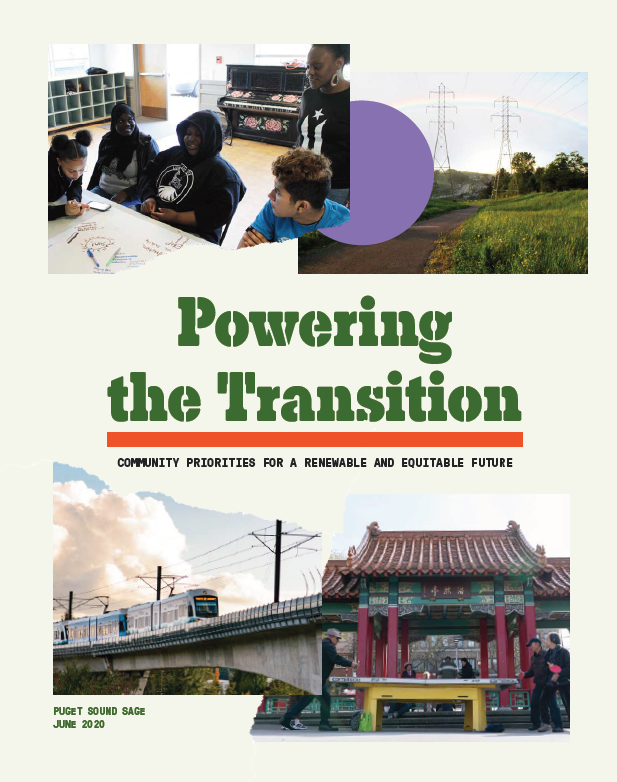Powering the Transition
Community Priorities for a Renewable and Equitable Future
A transition away from an extractive, fossil-fuel based economy towards a human-centered, renewable energy powered economy is required for humanity to survive climate change. Indigenous, Black, Brown, and low-income communities are most impacted by climate change despite contributing the least to the problem. Our expertise, decision-making, and leadership are critical to the success of policy-making needed to guide our region through these transformative times. In 2019, Puget Sound Sage embarked on a research project to determine our community’s top energy policy priorities. We heard opinions from hundreds of community members about climate change, renewable energy, transportation, housing, utilities, and more. Despite our community’s great diversity of identities and experiences, clear patterns emerged.
This is what we learned:
Our community’s top climate concerns are poor air quality, food insecurity, and affordable housing
Access to clean air, healthy and affordable food, and affordable housing are basic human rights that our communities are fighting for on a daily basis. Indigenous, Black, Brown, disabled, female, LGBTQ, and low-income people are hit first and worst by the impacts of climate change, which worsens existing disparities.
Focus transportation policy on shifting people from driving to other modes of transportation
Expand public transit, reduce fares, and electrify public transit infrastructure. We need to reimagine our transportation system to center people. We must build an integrated local and regional system that prioritizes walking, rolling, biking, and public transit over personal vehicles.
Pair infrastructure investments with anti-displacement policies
Transportation and energy infrastructure, programs, and resources meant to benefit our communities will displace our communities if not accompanied by policies that keep us rooted in place.
Meet the urgent need for low-income bill assistance and energy efficiency retrofits
Our low-income community members are over-burdened by the high cost of energy bills and often live in energy inefficient homes because of displacement and rising housing costs. We must increase outreach to ensure that all who qualify benefit from low-income bill assistance. Government must subsidize energy efficient upgrades so that everyone, including renters and people who live in older homes, has equal access to their cost-saving benefits.
The transition to renewable energy must have direct local benefits for frontline communities
Our communities want affordable energy prices, equitable distribution of solar infrastructure, and accountable utilities. The transition to renewable energy offers an opportunity to generate community prosperity. Our community needs the benefits of the transition to be reinvested back into our wallets, our neighborhoods, and our infrastructure. We prefer locally-controlled utilities over investor-owned utilities.
A promise of good jobs must be backed by real access and collective bargaining
The transition must incorporate existing fossil-fuel workers and prioritize job pathways to frontline communities. The renewable energy transition must generate good jobs for our community, and those jobs must be accessible to all members of our community, not only a privileged few. We must ensure workers entering, or transitioning to, the renewable energy sector can look forward to careers with wage, benefit, and workplace standards that allow workers and their families to thrive.
The transition to renewable energy must be led by frontline communities and funded by those who caused climate change
Corporations and individuals who created the capitalist structures driving climate change have rigged the system to accumulate and control the vast majority of the world’s wealth and resources amongst themselves. Government must partner with community to enact policy that ensures the cost of transitioning is assumed by those who have contributed the most to climate change and not Indigenous, Black, Brown, or low-income communities. Placing the burden of change and cost on our communities is ineffective and unjust. We have the vision to lead the transition and those who have benefitted from the extractive, profit-driven economy have the resources to fund it.

